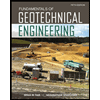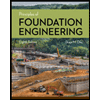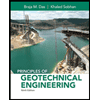
Bundle: Principles Of Foundation Engineering, 9th + Mindtap Engineering, 1 Term (6 Months) Printed Access Card
9th Edition
ISBN: 9781337947060
Author: Braja M. Das, Nagaratnam Sivakugan
Publisher: Cengage Learning
expand_more
expand_more
format_list_bulleted
Textbook Question
Chapter 12, Problem 12.8P
Consider a 500 mm diameter pile having a length of 18 m in a clay. Given: γ = 20.0 kN/m3 and cu = 60 kN/m2.
- a. Determine the maximum allowable load (Qall) with FS = 3. Use the α method and Table 12.11 for determining the skin friction and Eq. (12.20) for determining the point load. Allow a factor of safety of 3.
- b. What percentage of the ultimate load is being carried by the pile shaft? Is it a friction pile?
Expert Solution & Answer
Trending nowThis is a popular solution!

Students have asked these similar questions
$$ 5.1 Assume that you are observing traffic in a single
lane of a highway at a specific location. You measure
the average headway and average spacing of passing
vehicles as 3.2 seconds and 165 ft, respectively.
Calculate the flow, average speed, and density of the
traffic stream in this lane.
5.2 Assume that you are an observer standing at a
point along a three-lane roadway. All vehicles in lane
1 are traveling at 30 mi/h, all vehicles in lane 2 are
traveling at 45 mi/h, and all vehicles in lane 3 are
traveling at 60 mi/h. There is also a constant spacing
of 0.5 mile between vehicles. If you collect spot speed
data for all vehicles as they cross your observation
point, for 30 minutes, what will be the time-mean
speed and space-mean speed for this traffic stream?
Determine the direction of F2 such that the resultant force of adding F1 and F2 acts along the positive yaxis.
3 decimal places answer don't use ai
Chapter 12 Solutions
Bundle: Principles Of Foundation Engineering, 9th + Mindtap Engineering, 1 Term (6 Months) Printed Access Card
Ch. 12 - Prob. 12.1PCh. 12 - A 20 m long concrete pile is shown in Figure...Ch. 12 - A 500 mm diameter are 20 m long concrete pile is...Ch. 12 - Redo Problem 12.3 using Coyle and Castellos...Ch. 12 - A 400 mm 400 mm square precast concrete pile of...Ch. 12 - Determine the maximum load that can be allowed on...Ch. 12 - A driven closed-ended pile, circular in cross...Ch. 12 - Consider a 500 mm diameter pile having a length of...Ch. 12 - Determine the maximum load that can be allowed on...Ch. 12 - Prob. 12.10P
Ch. 12 - Prob. 12.11PCh. 12 - Prob. 12.12PCh. 12 - A concrete pile 16 in. 16 in. in cross section is...Ch. 12 - Prob. 12.14PCh. 12 - Solve Problem 12.13 using Eqs. (12.59) and...Ch. 12 - Prob. 12.16PCh. 12 - Prob. 12.17PCh. 12 - A steel pile (H-section; HP 310 125; see Table...Ch. 12 - Prob. 12.19PCh. 12 - A 600 mm diameter and 25 m long driven concrete...Ch. 12 - Redo Problem 12.20 using Vesics method, assuming...Ch. 12 - Prob. 12.22PCh. 12 - Prob. 12.23PCh. 12 - Solve Problem 12.23 using the method of Broms....Ch. 12 - Prob. 12.25PCh. 12 - Solve Problem 12.25 using the modified EN formula....Ch. 12 - Solve Problem 12.25 using the modified Danish...Ch. 12 - Prob. 12.28PCh. 12 - Prob. 12.29PCh. 12 - Figure 12.49a shows a pile. Let L = 15 m, D (pile...Ch. 12 - Redo Problem 12.30 assuming that the water table...Ch. 12 - Refer to Figure 12.49b. Let L = 18 m, fill = 17...Ch. 12 - Estimate the group efficiency of a 4 6 pile...Ch. 12 - The plan of a group pile is shown in Figure...Ch. 12 - Prob. 12.35PCh. 12 - Figure P12.36 shows a 3 5 pile group consisting...Ch. 12 - Prob. 12.37P
Knowledge Booster
Learn more about
Need a deep-dive on the concept behind this application? Look no further. Learn more about this topic, civil-engineering and related others by exploring similar questions and additional content below.Similar questions
- 4.5 in 2.5 in. D B1 0 140 lb 5 in. 40° 20 lb Replace the forces acting at A and D with an equivalent force-couple system acting at point B. Force B = acting at a angle measured from the Submit part Couple M= in the direction. answered Submit partarrow_forward4.5 in. 2.5 in. 140 lb B Only handwritten 5 in. 40° 120 lb Replace the forces acting at A and D with an equivalent force-couple system acting at point B. Force B = acting at a angle measured from the Submit part Couple M= in the direction. Unansweredarrow_forward1.) Calculate the internal forces and moments (shear force, bending moment, and axial force if applicable) at point C on the beam shown below. Clearly show all your steps, including the calculation of support reactions, and the determination of internal loadings at point C. (Ans: Nc = 0 kN, Vc = -6.53 kN, Mc = 71.68 kN.m) 40 pts. 7.5 kN A H 6.0 kN/m 4.0 kN 4.0 C B 2.0 3.0 7.0 1.5 2.0arrow_forward
- Please solve using cartesian coordinates. Be clear about why cos or sin is used (explain the trig). Make sure to account for the normal force.arrow_forwardSolve /Draw the shear force and bending moment for these Don't use Artificial intelligencearrow_forwardA For the gravity concrete dam shown in the figure, the following data are available: -The factor of safety against sliding (F.S sliding) =1.2 - Unit weight of concrete (Yeone) 24 KN/m³ - Neglect( Wave pressure, silt pressure, ice force and earth quake force) H=0.65, (Ywater)= 9.81 KN/m³ Find factor of safety against overturning (F.S overturning) 10m 5m 6m 80marrow_forward
- Draw the shear force and bending moment diagramarrow_forwardThe pin-connected structure consists of a rigid beam ABCD and two supporting bars. Bar (1) is an aluminum alloy [E = 75 GPa] with a cross-sectional area of A₁ = 850 mm². Bar (2) is a bronze alloy [E = 109 GPa] with a cross-sectional area of A₂ = 410 mm². Assume L₁=2.6 m, L₂-3.3 m, a=0.7 m, b=1.5 m, and c=0.8 m. All bars are unstressed before the load P is applied; however, there is a 4.5-mm clearance in the pin connection at A. If a load of P = 45 kN is applied at B, determine: (a) the normal stresses σ1,02, in both bars (1) and (2). (b) the normal strains €1, €2, in bars (1) and (2). (c) determine the downward deflection VA of point A on the rigid bar. (1) Answers: a (a) σ1 = (b) E₁ = (C) VA = i i i ล B C L2 b C MPa, σ = i με, Ε2 i mm. MPa. μεarrow_forwardThe pin-connected structure consists of a rigid beam ABCD and two supporting bars. Bar (1) is an aluminum alloy [E = 79 GPa] with a cross-sectional area of A₁ = 780 mm². Bar (2) is a bronze alloy [E = 104 GPa] with a cross-sectional area of A₂ = 460 mm². Assume L₁=1.6 m, L₂-2.1 m, a=0.6 m, b=1.8 m, and c-1.3 m. All bars are unstressed before the load P is applied; however, there is a 4-mm clearance in the pin connection at A. If a load of P = 58 kN is applied at B, determine: (a) the normal stresses 01,02, in both bars (1) and (2). (b) the normal strains €1,2, in bars (1) and (2). (c) determine the downward deflection VA of point A on the rigid bar. (1) L₁ B Answers: (a)σ = b ล L2 C D i MPa, σ1 = i MPa. με, Ε2 = i με. (b) €1 = i (C) VA = i mm.arrow_forward
- A load of P = 114 kN is supported by a structure consisting of rigid bar ABC, two identical solid bronze [E = 116 GPa] rods, and a solid steel [E=192 GPa] rod, as shown. The bronze rods (1) each have a diameter of 19 mm and they are symmetrically positioned relative to the center rod (2) and the applied load P. Steel rod (2) has a diameter of 28 mm. All bars are unstressed before the load P is applied; however, there is a 1.5-mm clearance in the bolted connection at B. Assume L₁ = 2.4 m and L₂ = 1.5 m. Determine: (a) the normal stresses in the bronze and steel rods (01, 02). (b) the downward deflection of rigid bar ABC. (1) Answers: L2 (a) σ1 (b) v = = i i B (1) MPa, 02 mm. = i MPa.arrow_forwardA load of P = 114 kN is supported by a structure consisting of rigid bar ABC, two identical solid bronze [E = 116 GPa] rods, and a solid steel [E=192 GPa] rod, as shown. The bronze rods (1) each have a diameter of 19 mm and they are symmetrically positioned relative to the center rod (2) and the applied load P. Steel rod (2) has a diameter of 28 mm. All bars are unstressed before the load P is applied; however, there is a 1.5-mm clearance in the bolted connection at B. Assume L₁ = 2.4m and L2 = 1.5 m. Determine: (a) the normal stresses in the bronze and steel rods (01,02). (b) the downward deflection of rigid bar ABC. (1) Answers: (a)σ1 = (b) vi L2 (2) (1) B P mm. Li MPa, 02 MPa. =arrow_forwardA high-density polvethelene (HD PE I9 - 780 MPaiy = 0.46 rod has a diameter of 70 mm before load Pis applied. In order to maintain certain clearances, the diameter of the rod must not exceed 72 mm when loaded. What is the largest permissible compressive load P that can be applied to the HDPE rod?arrow_forward
arrow_back_ios
SEE MORE QUESTIONS
arrow_forward_ios
Recommended textbooks for you
 Principles of Foundation Engineering (MindTap Cou...Civil EngineeringISBN:9781337705028Author:Braja M. Das, Nagaratnam SivakuganPublisher:Cengage Learning
Principles of Foundation Engineering (MindTap Cou...Civil EngineeringISBN:9781337705028Author:Braja M. Das, Nagaratnam SivakuganPublisher:Cengage Learning Fundamentals of Geotechnical Engineering (MindTap...Civil EngineeringISBN:9781305635180Author:Braja M. Das, Nagaratnam SivakuganPublisher:Cengage Learning
Fundamentals of Geotechnical Engineering (MindTap...Civil EngineeringISBN:9781305635180Author:Braja M. Das, Nagaratnam SivakuganPublisher:Cengage Learning Principles of Foundation Engineering (MindTap Cou...Civil EngineeringISBN:9781305081550Author:Braja M. DasPublisher:Cengage Learning
Principles of Foundation Engineering (MindTap Cou...Civil EngineeringISBN:9781305081550Author:Braja M. DasPublisher:Cengage Learning Principles of Geotechnical Engineering (MindTap C...Civil EngineeringISBN:9781305970939Author:Braja M. Das, Khaled SobhanPublisher:Cengage Learning
Principles of Geotechnical Engineering (MindTap C...Civil EngineeringISBN:9781305970939Author:Braja M. Das, Khaled SobhanPublisher:Cengage Learning

Principles of Foundation Engineering (MindTap Cou...
Civil Engineering
ISBN:9781337705028
Author:Braja M. Das, Nagaratnam Sivakugan
Publisher:Cengage Learning

Fundamentals of Geotechnical Engineering (MindTap...
Civil Engineering
ISBN:9781305635180
Author:Braja M. Das, Nagaratnam Sivakugan
Publisher:Cengage Learning

Principles of Foundation Engineering (MindTap Cou...
Civil Engineering
ISBN:9781305081550
Author:Braja M. Das
Publisher:Cengage Learning

Principles of Geotechnical Engineering (MindTap C...
Civil Engineering
ISBN:9781305970939
Author:Braja M. Das, Khaled Sobhan
Publisher:Cengage Learning
Concrete Slab Calculations 006; Author: Jerry Howard;https://www.youtube.com/watch?v=R19jILyBxio;License: Standard Youtube License